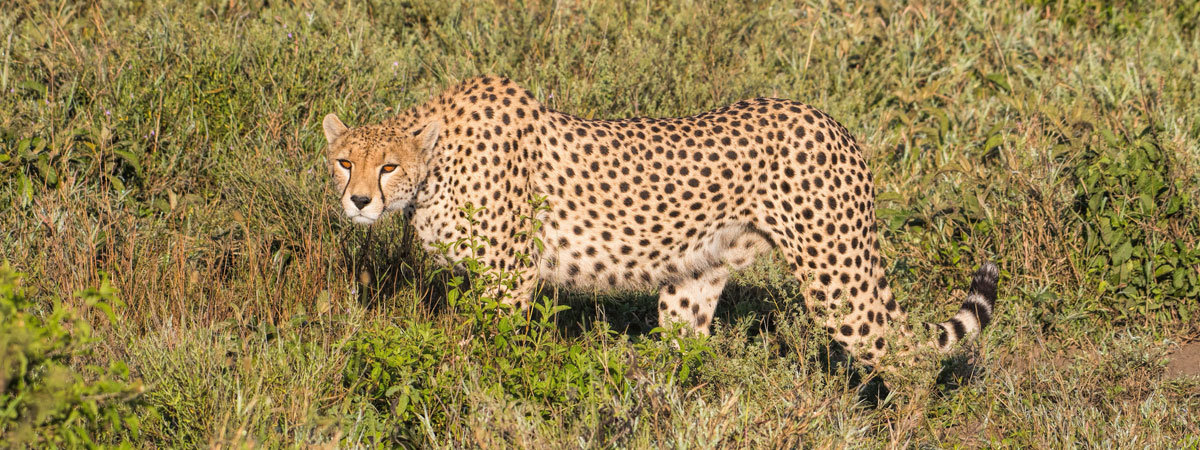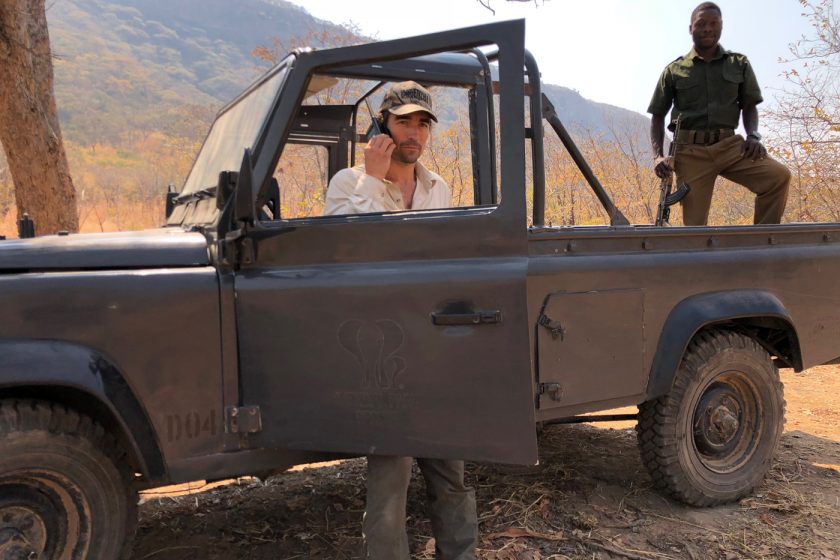Interview with Dr Niall McCann, concluding part
Part 1 was posted here on 22 October 2019, Part 2 was posted here on 23 October 2019, Part 3 was posted here on 30 October 2019.
TMD – We’ve touched on this already, but I’m keen to delve a little deeper. You’re working on the front line of conservation, very much so. In your opinion is it a battle that we are winning?
NM – Since 2011 poaching rates of elephants have decreased, so that’s a positive thing. In most parts of Africa elephant numbers are relatively stable, but the illegal wildlife trade is still a 20 billion dollar a year industry and those gangs that make vast profits from that are still making vast profits from that. Some species, like pangolins, are still being taken out of Central Africa at a rate that is completely unsustainable.
Your high profile species, like elephants and rhinos are better protected, but it is still 2 steps forward one step back. We’ve got to be really really careful taking any pressure off the fight because poachers seek the line of least resistance. At the moment the line of least resistance is in Central Africa. Central Africa is getting smashed; forest elephant populations are still dropping off a cliff whereas savannah elephant populations are relatively stable because people have realised that these need to be protected and so they are better protected.
Niassa was losing elephants at an astonishing rate; it now isn’t. Selous was losing elephants at an astonishing rate and it now isn’t because the Tanzanians since 2014 have stepped up their game. But in Central African countries not only are those forests enormous and really difficult to patrol but there’s political instability, there’s quite a bit of antipathy towards conservation anyway and so the poachers are really now focusing their efforts on Central Africa and Nigeria as well.
What you have to realise is that because poachers are seeking the line of least resistance whenever you step it up in one place they will go somewhere else. Until we sort out the root cause, which is the fact that the Chinese still have an insatiable desire to consume wildlife products from Africa. There are a few other nations that are, lamentably, involved but China is by far the biggest volume. And that’s a major issue.
The way I’ve had it explained to me by someone is that the current conservation efforts that I’m involved in are the equivalent of standing at the edge of a waterfall and someone upstream has released a load of babies in baskets and they’re floating downstream and I’m trying to stop all the babies tipping over the edge and that’s critical and I need to do that. But we need to find who the hell is putting a load of babies in baskets into the water just upstream and stop that. And that’s the Chinese.
The South East Asian and East Asian demand for resources has to be stopped, and that’s going to be generational as well.
You get people in China saying “Oh but my ivory is from sustainable elephant sources”, there’s no such thing. But they don’t know that.
There were 26 million elephants in the 1500’s, then there were 2 million in 1900 and then there were 1.2 million in 1980 and now there’s 400,000 so they were being killed at an extraordinary rate throughout. It didn’t seem like it was making much of a difference because there were always so many. It’s only now, when suddenly there aren’t that we realise that this is unsustainable.
Again we can’t be overly sanctimonious because people were still consuming ivory products in the UK until very recently. It’s only this year that we’ve actually had strict ivory regulation enacted; against the clamour from all of the auction houses, furious that it was going to be potentially damaging their profits. Under 2% of their profits are related to ivory but still they were furious that we might be denting that.
But it was demonstrated that although they were saying that they were only selling antique ivory, they could only prove the provenance of about 10% of the ivory coming through their houses, which is absurd.
The Chinese are a disaster for wildlife but we can’t be overly sanctimonious because up until a generation ago we were a disaster as well. We’ve only recently shifted and that shift has to take place there as well and it’s a cultural shift, and cultural shifts take a generation.
The young people in China are well connected. Even though there are Internet blocks, they are well connected and there has to be a constant hammering of social media to try and educate that populace because that’s what it’s going to take. It’s going to take that young generation. The Chinese Baby Boomers are an absolute disaster but the young population are more engaged, more worldly. They speak English as well as Mandarin and they’re the people we have to really be focusing on and there are organisations that are doing that.
I would love us to as well, but that is not our thing at the moment. In the long term I would love to be involved in demand reduction because that is the key.
TMD – How near do think we are, if at all, to the time when Africa can look after its wildlife without the need for outside donations.
NM – Whew! We are not very near.
I think that foreign organisations will still be heavily involved in African wildlife conservation for the rest of my lifetime.
It’s going to take at least a generation for Africa to be able to protect its own wildlife; if it ever chooses to. It will take a value shift. People make the mistake of thinking that everybody has the same values, but they don’t.
A British person has fundamentally different values to a Chinese person to a Khoi San, to a Bantu. At the moment there isn’t a sufficient value put on wildlife in the cultural norms of Sub Saharan Africa. That might take a while; it might not happen at all.
What we have to try and do is identify those members of that society who do have a very different mentality towards their wildlife, that do want to protect it that do see its value and you build them up. These parks, park authorities, local NGOs need to be run by Africans, so it’s identifying those people that have that mentality.
We have to do everything we can to boost the capacity of those local people so that they can run their own parks but it’s not an easy thing to identify or then to do and we’ve seen it go disastrously wrong in various countries as well.
TMD – The majority of the funds is coming from foreign organisations and, unsurprisingly, they want to make sure it is used for the purpose it was donated for.
NM – A lot of the time that hasn’t happened; right across the spectrum of aid. So everyone needs to be clever about how they donate.
What we do is we don’t donate. Nothing is donated, we keep complete control over all those assets. The Parks Authority don’t like that because they want us to just give them a car. But we explain that if we give you a car and it breaks down, you have to fix it. Whereas if we keep the car it is our asset; we will fix it if it is broken down.
The reason we’re doing that is because we’re not going to be an aid organisation; we are not going to do that, it does not work. Fundamentally it infantilises the country you’re working with.
TMD – It drastically reduces their motivation to become self sufficient.
NM – Yeah, completely.
I’m working more and more closely with DFID and I’m encouraging them to be very very specific about how they donate when it comes to biodiversity and climate change because they’re giving a lot of money. They’re announcing huge increases in the amount of money for biodiversity protection and climate change mitigation.
TMD – There’s a lot of generalisation and over simplification. People talk about ‘Africa’s’ elephants as if all countries face the same problem and yet the problem facing Kenya and Tanzania is totally different to the problem facing Botswana and Zimbabwe. Some countries have too many elephants and some don’t have enough.
NM – Every single operation needs to be local, it needs to be ad hoc, because the problems and opportunities of each operation will be very specific. What we did in Malawi will not work in Zimbabwe; what we do in Zimbabwe will not work when we go to Congo or Mozambique or wherever we go next.
You have to understand the local geography, the local politics and everything else to make it function.
TMD – If conservation is going to succeed it needs to be driven by Africans.
How can African governments balance conservation of their natural resources with the demand from their population for access to areas that have been given over to wildlife because they need more land, more space?
NM – The thought that conservation is ‘zero sum’; that it’s either for animals or it’s for us, is dangerous, poisonous and wrong.
We see that in the UK. In a recent interview the Chancellor of the Exchequer talked about switching over to a Green economy and how much it’s going to cost us.
It’s not going to cost us anything. What’s going to cost us is when the whole country goes underwater.
Switching over to a Green economy so you have a functioning country is what’s necessary and in Africa a policy of turning over land to people would just fail. They’d use up all the resources of that land and then they’d demand more. There’d be nothing left for anybody.
What has to be explained is firstly; stop having children at the rates that you are, wherever in the World you are. Population growth is unsustainable.
We do have the technology to feed the World on the land that’s available today, we’re just not using those technologies well enough. There’s a huge amount of inefficient agriculture happening everywhere, Africa in particular.
What needs to happen is the planting of more trees; turning over more land to trees so that we have climate mitigation. The countries that are going to be the worst affected are those tropical belt countries and that is going to raise an enormous number of migrants coming to Europe which is going to prejudice the European populations against Africans even further.
We need to be encouraging governments to develop natural resilience to climate change and they can only do that by increasing the amount of land available for wildlife. That means forests and savannas and those kinds of places that are carbon sinks.
With population you need to stop people having crazy numbers of children, which is totally unsustainable.
Africa’s population is predicted to grow to 2 billion people by 2050, which is absurd; not sustainable. Reducing human population increase is essential.
Maximising our ability to grow food on the land available is absolutely key.
Then fundamentally shifting our mentality to realise that we need functioning wild areas in order to have a functioning society. We cannot function on a country that is built of tarmac.
We have to change the thought that environmentalism is zero sum, here as well as in Southern Africa. It’s an absurd thought that if you give something to wildlife you automatically take away from people. If you put the environment first everyone benefits in the long term. It requires thinking in a long term mentality. No politicians have a long term mentality, they think in 4 year cycles.
There is no such thing as infinite growth on a finite planet and we absolutely need functioning eco-systems to have a functioning society.
TMD – Is there any hope, do you think, of creating and maintaining wildlife corridors? Peace Parks and the Trans-frontier parks claim to be doing it but I don’t think they are very effective.
NM – I’ve been and met with them, and I’ve also been to their parks and they aren’t working.
It’s something that is vital; creating these corridors is critical but it will take a lot of high level diplomacy to get that to happen.
TMD – And it requires an understanding within the communities affected that allowing the wildlife to survive will improve their quality of life.
NM – Yes, environmentalism is not ‘zero sum’. People are just starting to realise, even in the UK, that we need pollinators. That’s been the gateway drug; now everyone knows about bees and how important they are. Before too long they’ll realise that other aspects are critical as well, we need trees up in the watersheds otherwise we’re going to continue to get flooding. People need to understand eco-systems and it’s just breaking into public consciousness here and it’s going to take a lot longer for it to break into public consciousness in Africa as well; but it is critical.
TMD – Maintaining a park is an expensive business; maintaining it well is even more expensive. As you’ve said, there are some ‘honeypot’ parks that get money. Do you see Chizarira ever being on a tourist circuit?
NM – It should get on the overland circuit, the self-drive circuit in particular. The hope for Chizarira, because of its relative isolation, it’s about 7 hours’ drive from Vic Falls, about 9 or 10 hours from Harare, so it’s not close to anything. The hope for Chizarira is high end tourism; people that fly in.
TMD – So then you need a lodge.
NM – There is one, it just hasn’t been open for years. It’s there but barely got started. Amazingly it hasn’t been pilfered, probably because the community has a share in it ansd they’re still wanting it to work.
A lodge is key. And then getting Chizarira, and Zimbabwe in general, back on that Southern African overland, self-drive map.
That was crippled by the road blocks in Zimbabwe brought in by Mugabe towards the end of his tenure. People were getting stopped every few miles for non-existent problems with their cars. South Africans said ‘ we don’t need to put up with that, we’ll go somewhere else instead’.
Now that that has changed, Mnangagwa has stopped those road blocks here’s hope the South Africans will come back.
We’re putting in infrastructure. There’s only 2 campsites in Chizarira, and 4 defunct ones we’re working to restore. Once that’s ready then should be able to put it back on the self-drive map.
Chizarira is amazing for them. It’s never going to have loads of tourists, it does give you that wilderness which people want.
TMD – Given that it’s expensive, do you think we’re likely to see the number of parks increase or diminish?
NM – I think inevitably diminish. Some parks will be de-gazetted and turned over to different land use. What I hope is that that land use is still for wildlife; as a safari area or something like that.
A concern is that if parks get de-gazetted they just get turned over for communal use which will be basically agricultural grazing and that would be a disaster.
Yes National Parks are expensive, but they are the only way we can guarantee that land is used for wildlife and for climate generation; that’s what wild areas do, they generate our climate. So they’re an expensive necessity until there’s a sufficient realisation that we need lots of wild areas.

National Park Rescue is entirely dependent on philanthropy.
If you would like to support their work you will find options for donating on their website – https://www.nationalparkrescue.org/


